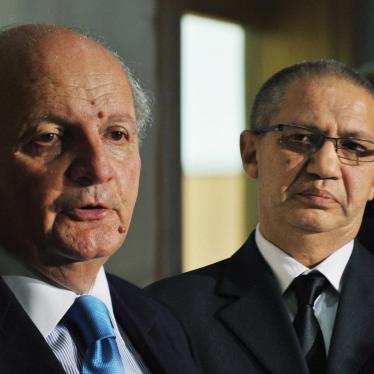July 3, 2013, Update
On June 26, Golos was the first independent Russian group the Justice Ministry suspended under the “foreign agents” law. The ministry effectively banned Golos from conducting any public or financial activities. The official suspension followed a June 14 ruling by an appeals court, upholding the first instance court’s decision that Golos Association was in violation of the “foreign agents” law. The appeals court disregarded a letter from the group’s bank stating that Golos had not received any foreign funding since November 2012, when the law entered into force.
Golos has already paid 400,000 rubles (approx. USD 12,500) in fines. Its deputy director, Grigory Melkonyants, told the media and confirmed to Human Rights Watch that the group would dissolve rather than allow itself to be labeled a “foreign agent.” He said the leaders would try to register a new organization to carry on Golos’s work with no foreign funding. He also said that while the registration of the new group is being processed, it would act as a nonregistered public association, which is allowed under Russian law, and monitor local elections in the autumn.
However, on June 29, a Justice Ministry spokesperson said that if the Golos activists continued their activities after the organization was suspended, they could face sanctions.
“The suspension of Golos is clearly unjust and arbitrary from the standpoint of Russia’s international human rights obligations,” said Hugh Williamson, director of the Europe and Central Asia Division at Human Rights Watch. “Punishing the Golos activists for continuing their work would be a blatant violation of freedom of association.”
Freedom of association is guaranteed by article 11 of the European Convention on Human Rights, which says that there should be no restrictions on the exercise of this right “other than such as are prescribed by law and are necessary in a democratic societyin the interests of national security or public safety, for the prevention of disorder or crime, for the protection of health or morals or for the protection of the rights and freedoms of others.”
Under the Russian Constitution, “everyone has the right to freedom of association.” Article 19 of the Federal Law on Public Associations contains a list of restrictions that would prevent certain individuals from founding or belonging to an association, but membership in another group that was suspended is not among those exclusions.
_________________________
(Moscow, April 25, 2013) – The decision of a Moscow court on April 25, 2013, to fine an independent nongovernmental organization and its leader is an alarming indicator for the future of civil society in Russia.
The Association in Defence ofVoters’ Rights Golos (Voice) became the first Russian nongovernmental organization to fall afoul of the “foreign agents” law. It was fined 300,000 rubles (almost US$10,000).
Golos played a prominent role in organizing election monitoring and reporting allegations of electoral fraud in the 2011 parliament and 2012 presidential elections.
“The case against Golos should never have been brought, let alone succeeded,” said John Dalhuisen, Europe and Central Asia program director at Amnesty International. “The foreign agents law is a bad law that was introduced for political reasons. It is sadly not surprising that it has resulted in politically motivated decisions. The foreign agents law is a stick to beat watchdogs with and needs to be repealed.”
Golos is alleged to have violated a lawintroduced in 2012 requiring organizations in receipt of foreign funding to describe themselves as “foreign agents” if they engage in undefined “political activities.” The law imposes restrictions on the freedom of association that are inconsistent with international human rights standards.
It is the first organization to face charges since a wave of inspections in recent weeks targeted more than 200 organizations across the country – including the Moscow offices of Amnesty International and Human Rights Watch.
The Russian authorities accused Golos of receiving approximately US$10,000 in prize money after being presented the Andrei Sakharov Freedom Award by the Norwegian Helsinki Committee, though the group instructed its bank to return the money, which it did. The Ministry of Justice claimed that Golos’ advocacy for the adoption of a unified Electoral Code sought to “influence public opinion and decisions of government bodies,” which, in their opinion, constituted “political activity.”
“Today’s ruling is a shot across the bow at Russian civil society and a terrible precedent,” said Rachel Denber, deputy Europe and Central Asia director at Human Rights Watch, who attended the hearing. “Russian authorities should withdraw the case against Golos and welcome NGO work, not hinder it.”
The Golos director, Liliya Shibanova, was also fined 100,000 rubles (approximately US$3,000).
News of the sanctions against Golos came on April 25, as President Vladimir Putin engaged in a call-in show answering questions from callers across the country.
“At the same time as the court hearing, President Putin was telling the public that organizations highlighting violations should be valued,” Dalhuisen said. “The fines levied against Golos clearly show what their reward will be.”
Another group, the Kostroma Regional Centre for Support of Public Initiatives, will face similar charges on April 29 for having organized a roundtable on US-Russia relations that a US diplomat attended. A further nine groups – whose activities range from ecological initiatives to supporting children with a rare genetic disease – have received official warnings from the prosecutor’s office.
In reports published on April 24, “Freedom under threat: The clampdown on freedom of expression, assembly and association in Russia” and “Laws of Attrition: Crackdown on Russia’s Civil Society after Putin’s Return to the Presidency,” Amnesty International and Human Rights Watch, respectively, noted that the systematic undermining and violation of the rights to freedom of expression, assembly, and association have been the hallmark of Putin’s human rights record during the first year of his third term.








